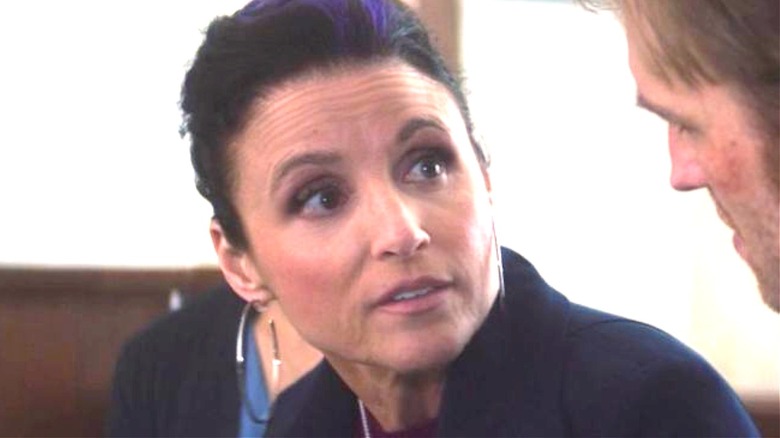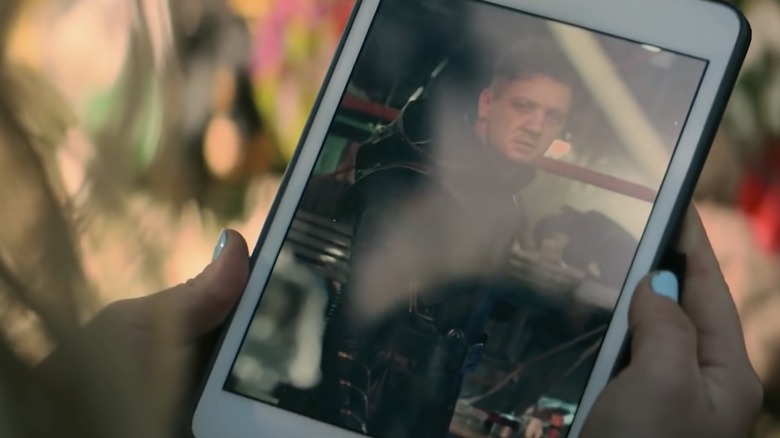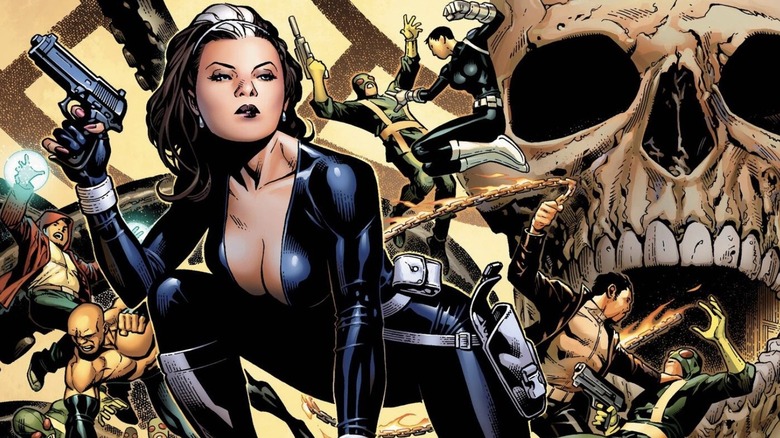The Weird Reason Contessa Valentina Allegra De Fontaine Probably Isn't A Villain In The MCU
If you've been watching the most recent Marvel TV shows and movies, you'll know Contessa Valentina Allegra de Fontaine, played by Julia Louis-Dreyfus. She's a somewhat shadowy figure who first appeared in a couple of episodes of "The Falcon and the Winter Soldier," and then popped up somewhat unexpectedly in the post-credits scene of "Black Widow." The Contessa is clearly manipulative and likely even deceptive, with motives that are unclear at best. But until "Black Widow," when she gave Yelena Belova (Florence Pugh) an assignment at her Natasha Romanoff's (Scarlett Johansson) gravesite to kill Clint Barton (Jeremy Renner), she hasn't necessarily appeared evil.
Valentina first made contact in a mysterious manner with John Walker (Wyatt Russell) and his wife Olivia (Gabrielle Byndloss) in the "Falcon and the Winter Soldier" episode "Truth," leaving a blank business card. Then, during that series' last episode, she shows up again to name Walker "U.S. Agent." To Yelena Belova in "Black Widow," Val says, "Maybe you'd like a shot at the man responsible for your sister's death." Yelena doesn't appear to know the whole wrenching story of Nat's death the way the movie-going audience does. (It should be noted, by the way, that "Black Widow" was supposed to predate "The Falcon and the Winter Soldier.)
But is Val actually an enemy of the Avengers? It's hard to say. Despite taking on a role that no viewers wanted him to take because Sam Wilson (Anthony Mackie) is clearly the right successor for Captain America, U.S. Agent isn't truly a bad guy. And Val may herself be misled about Clint Barton, or she may only be working for someone who simply doesn't like Hawkeye.
If you're wrestling with the character's morality and wondering exactly what her story is, there's one big piece of evidence that shows the Contessa might not be destined for villainy.
Apple doesn't allow villains to use its products on screen
In a Vanity Fair video from 2020 analyzing a specific scene from his film "Knives Out," director Rian Johnson revealed a behind-the-scenes movie secret about Apple: The company doesn't allow filmmakers to show villains using Apple products.
"I don't know if I should say this or not — not 'cause it's lascivious or something, but because it's gonna screw me on the next mystery movie that I write. But forget it, I'll say it, it's very interesting. Apple, they let you use iPhones in movies, but — and this is very pivotal — if you're ever watching a mystery movie, bad guys cannot have iPhones on camera," Johnson explained. "Every single filmmaker who has a bad guy in their movie that's supposed to be a secret wants to murder me right now."
This is clearly a long-running rule, since Wired pointed out way back in 2002 that the villains in "24" were using Windows computers, while the good guys had Mac computers. In its legal guidelines for third parties using Apple trademarks and copyrights, the company says, "The Apple product is shown only in the best light, in a manner or context that reflects favorably on the Apple products and on Apple Inc" (via Apple.com).
What does this have to do with "Black Widow," you ask? Well, in the post-credits scene, Val takes out an iPad and shows Yelena a picture of her next mark: Clint Barton. It might be possible in some ways to obscure the Apple branding or the styling of the frame of the tablet she's using, but in this case, fans actually see a close-up of the tablet itself — complete with product's sleek styling, the camera lens at the top, and the middle button at the bottom.
Using Apple logic, then, fans can assume that the Contessa isn't actually an antagonist in the Marvel Cinematic Universe. However, her true role remains a mystery.
The character's comic book history seems to validate this
In Marvel history, as compiled by fans on the website Fandom, Contessa Valentina Allegra de Fontaine is also a rather murky character when it comes to her allegiances — but mostly, she seems to be one of the good guys. She starts her career as a Russian sleeper agent during the Cold War when she's quite young, becoming part of a Leviathan spy family that relocates to Italy to pose as part of the resistance against the communist Soviet Union.
At one point, she's an agent of SHIELD loyal to Nick Fury, whom she bests in hand-to-hand combat in her first comic book appearance, "Strange Tales" #157 from 1967. In fact, Val is even romantically linked to him — but also to Captain America, causing the two of them to fight over her and resulting in a frosty relationship with Cap's girlfriend Sharon Carter, who's a member of the Femme Force that Val leads for some time. When Fury goes underground, Val becomes the British liaison for SHIELD.
So far, so good. However, the character also eventually joins Hydra and takes on the identity of Madame Hydra, betraying the organization to Leviathan (via Marvel.com). Basically, she infiltrates both SHIELD and HYDRA, turning out to be a triple agent loyal only to Leviathan. She then turns herself in to the authorities, but Nick Fury breaks her out.
In true comic book fashion, it's a bit more complicated than that, of course. And the MCU certainly isn't required to stick to any part of her previous, official Marvel history as Phase 4 takes shape going forward. Still, the Contessa's profile combined with Apple's clear disdain for being associated with the bad guys means her future outings in the MCU could be pretty darn interesting — no matter who she turns out to be allied with.


